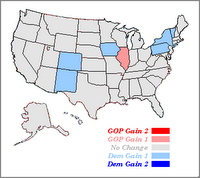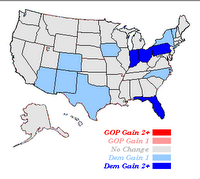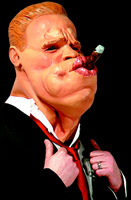 One week to go. One week from now the polls will have closed on the east coast, and we will have our first indication of whether the Democrats will secure a majority in the House and/or in the Senate, or whether we will have two more years of single party Republican control. What is going to happen? - Beats the hell out of me.
One week to go. One week from now the polls will have closed on the east coast, and we will have our first indication of whether the Democrats will secure a majority in the House and/or in the Senate, or whether we will have two more years of single party Republican control. What is going to happen? - Beats the hell out of me.Early in the short life of this blog, we posted "There is work to do", and linked to Scott Elliott at "Election Projection" for an early prediction on the midterm elections. With our focus primarily on the House races, we intended to track Scott and other polls as we drewn near the election. But between Scott, Real Clear Politics, MSNBC/National Journal, Washington Post, Daily Kos, Electoral Vote, Californian in Texas, Polling Report, UnFutz, etcetera, etcetera, etcetera - any additional poll tracking here at DWSUWF seems rather superfluous.
But with a week to go, out of this giant haystack of data, there are three needles that caught my attention. Three prognosticators, making three predictions, all of which seem reasonable, but all of which cannot be true.
I. Scott Elliott and the Blogging Caesar Edicts
When we first visited Scott last May, he had recently issued his "Edicts 1 & 2" predicting that the Republicans will maintain the majority in both the House and Senate. Time to check back in. In a recent post, he reinforced his prediction despite a dramatic change in his projections:


From May to October, Scott's projection has moved from a +6 Dem gain to a +17 Dem gain in the House.
"By the way, let me confirm once again that I stand by all of the edicts I decreed earlier this year.
* The GOP will hold the House - April 24
* The GOP will hold the Senate - April 28
In the Senate, though not much happened last week, look for polls this week in Tennessee and Missouri to show Corker and Talent with small leads, respectively. And look for Allen's lead to grow some in Virginia next week as well. The huge financial advantage enjoyed by several GOP senate candidates should start to pay dividends in some of these close races. I think the chances of the Democrats taking the Senate are very, very slim. Overall, it is clear to me that the GOP has indeed turned the corner..."
----
UPDATE: November 7, 2006I guess you have to admire the "Blogging Caesar" going down with his prediction "ship", but with his own projections showing a 20+ Democratic seat swing in the House of Representatives, this prediction on election day certainly undermines his credibility as an analyst and his ablility to see through his own partisan bias when he says in his self described "Mother of all Disclaimers":
Seriously weird. - First he is saying that the Republicans will keep the house, then he says they may not, and finally says he would consider himself wrong no matter what. At least he is right about that last part. Take off those rosy red glasses Scott!
UPDATE: November 08.2006
Scott partially redeemed himself in my mind when he finally came face to face with reality in the wee hours of election morning (but he has yet to recognize how he let his partisan bias undermine his otherwise excellent analysis):
"Update(11:30pm): The House goes to the Democrats, and the crow goes in the oven. (That darn disclaimer!)Great analysis, and a bad prediction. Better luck next time.
Update(12:00am): I take my hat off to Stuart Rothenberg.
Update(2:30am): Note to self: TRUST THE NUMBERS!! Loss of 6 in the Senate, 24 in the House, and 7 Governors - sounds pretty good about now, doesn't it?"
----
II. Ken Fisher and the 100 Year Rule
Ken Fisher is a financial columnist in Forbes and a money manager based in California. I have been following his market advice for years, and found him to be remarkably accurate in calling market moves. He subscribes to the hypothesis that election cycles can have a major affect on markets (among many other factors), and tracks them closely for his readers and clients. As recently as his September column, he was also prediciting that the Republicans would hold on to majorities in the House and Senate:
"A basic rule of politics and a little-known fact: The Senate changes hands so much more easily than the House that in 100 years the House has never changed hands unless the Senate has, too. For the Democrats to win the House they must win the Senate, which means they must win almost every close race--something that almost never happens. I count only seven this year. There are more Democratic than GOP Senate seats up in 2006. And two more open Democratic seats than Republican; that's more for the Democrats to defend... My forecast is for the GOP to lose three seats in the Senate and six in the House. "
"Since the Seventeenth Amendment allowed for direct election of Senators in 1913, the House majority has never changed hands without the Senate also doing so. Therefore we look first to the Senate to determine the outcome of the election, as it is more volatile. Our analysis indicates that there will be no change in the Senate; therefore Republicans will maintain control of the House. The House changing leadership without the Senate also doing so would be unprecedented."
"You might have that nightmare in which the Democrats sweep Congress and you wake up one morning to find Charles Rangel sitting at your kitchen table filling out your 1040. The New York liberal might be the next House Ways & Means Committee chairman. Suppose, that is, that my last column, predicting that the GOP would hold both houses, is just wrong. (For which I can thank Mark Foley.) How bad will a Democratic win be for investors? Not bad enough, I submit, to sell stocks now. "
From his prior columns, we know that Ken (like Lawrence Kudlow, and many investors) follows the election betting markets closely, as they consider them more accurate predictors of election results than the polls. In particular, the tradesports.com futures contract on Republicans holding the House and Senate are frequently touted by pundits. The betting contracts as of the time of this post, show the probability of the Republicans maintaining their majority in the Senate at 71% (and dropping slowly) and the probability of the Republicans maintaining their majority in the House at 34% and stable:
 The Tradesports GOP Senate Contract - Showing a slight drop in October, but consistenly predicting a 70% to 85% probablility of the GOP keeping the Senate over the last year.
The Tradesports GOP Senate Contract - Showing a slight drop in October, but consistenly predicting a 70% to 85% probablility of the GOP keeping the Senate over the last year.  The Tradesports GOP House Contract, which dropped from a 60% probability of the GOP maintaining control of the House at the end of September, to a 34% probability with one week to go.
The Tradesports GOP House Contract, which dropped from a 60% probability of the GOP maintaining control of the House at the end of September, to a 34% probability with one week to go. There you have it. With seven days to go, the betting contracts are prediciting that a 100 year old electoral precedent is going to be violated. So either A) Something has changed structurally in the electoral process that we have not seen in 100 years -or- B) The futures contract is flat wrong and -either- C) The Republicans will indeed retain the majority in both houses -or- D) The Democrats will take both houses. Really interesting, but like I said ...
Who the hell knows? What do you think?
I'm betting on the trading contract: Dems take the House, Republicans keep the Senate. The best of all possible results.
Divided and Balanced.™ Now that is fair.
Just Vote Divided.
Just Vote Divided.
Technorati tags: divided government, midterm, libertarian, 2006 election, polls














